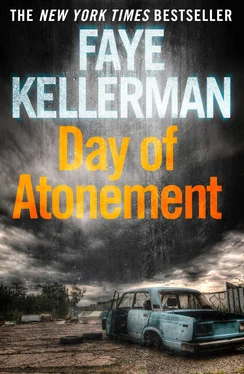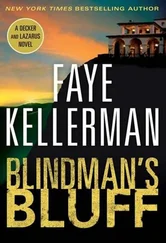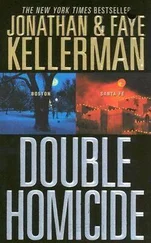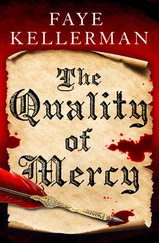Another little piece of dirt neatly swept under the carpet.
Sora Lazarus said, “The men already went to the mikvah. You want me to take you there?”
“Let’s let it go this time, Eema,” Rina said.
It was customary for men to go to the ritual bathhouse before the high holidays. But the idea of bathing in communal water made Decker squeamish. He gave her an appreciative smile.
Sora Lazarus said, “Then maybe you’d like some breakfast? A cup of coffee?”
“A cup of coffee sounds great,” Decker said.
“Then you sit at the table,” the little woman said. “I’ll get you some coffee and a little pastry—”
“Just coffee, please,” Decker said. “Black.”
“Black?” Sora Lazarus said. “No milk? No sugar?”
“Just black,” Decker said. “Please.”
“Rina,” Sora Lazarus said, “sit with your husband. I’ll bring you some coffee, too.”
“I’ll get it,” Rina said.
“Don’t be silly,” chided Sora Lazarus. “Sit.”
A moment later they were alone in the dining room, sipping coffee at a table fit for a mess hall.
“The Lazaruses are having a bit of company?” Decker asked.
“Thirty-six people. Not including the kids’ table.”
“A small intimate meal.”
“It’s tradition,” Rina said. “My mother-in-law always has the Levine family over on the first night of Rosh Hashanah; we go over to the Levine house for lunch the next day.”
“How many Levines are we talking about?”
“Rabbi and Mrs. Levine, their five children and who knows how many grandchildren. And Mrs. Levine’s parents. They must be in their eighties by now.”
“Is everyone going to talk in Yiddish?”
“The grandparents do, but the five kids are our age. The oldest must be a few years younger than you. Shimmy—nice guy, good-looking, too.”
“You notice these things.”
“I’m religious but not blind.”
“Well, you’d have to be nearsighted to marry me.”
“You’re fishing for compliments, I’ll give you one,” Rina said. “I think you’re gorgeous. Or as they say in Brooklyn, gohjus.”
Decker said, “Am I as gohjus as Shimmy?”
“Better,” Rina said. “Shimmy—like you—has a good sense of humor. I think you’ll like him.”
“I can feel a friendship brewing.”
“Oh, cut it out.” She punched him in the shoulder. “Mrs. Levine’s youngest son, Jonathan, is—believe it or not—a Conservative rabbi.”
“A rebel in the midst.”
“You make light, but his father’s heartbroken.”
Decker shook his head. “That kind of reactionary thinking is incredible to me.”
“That’s because you don’t understand what it represents to Jonathan’s father. Conservative Jews don’t believe that oral law is as important as written law. So oral law—which is holy to us—can be changed by man. That’s a major break, Peter. Even though Jonathan is pretty traditional in his own practices, his father feels that Jonathan has rejected him and everything he believes in.”
“Is that what you think?”
“I don’t agree with Jonathan, but I know he’s sincere. And although I understand Rav Levine’s feelings, I feel bad for Jonathan. His father makes this big show of not speaking to him—unless they’re arguing Jewish law. Mrs. Levine ignores his hostility and invites Jonathan to every holiday meal. It’s uncomfortable at first, the father addressing Jonathan in the third person. ‘Can someone ask Mister Levine to pass the flanken?’ Mr. Levine, mind you, never Rabbi Levine. It’s become sort of a joke by now, but I know it makes Jonathan feel lousy.”
“And here I thought this was going to be boring.”
Rina smiled. “Jonathan’s mother is more tolerant. You’ll like her, Peter. She and Mama Lazarus are best friends. She’s as feisty as they come. She was a legal secretary for the criminal court system in Queens for years, always worked, which was very unusual for Orthodox women her age. Being a cop, you two will probably have lots to talk about.”
“Yes, we can talk about assholes”—Decker smiled—“excuse me—miscreants.”
“You’re going to have to watch that.”
“No problem, honey,” Decker said. “I don’t intend to talk much.”
“I know this is very hard for you,” Rina said. “A lot of change in the last couple of years.”
“True ’nough, woman, true ’nough.”
Rina hesitated, then whispered, “Are you happy?”
“Ecstatic.”
Rina looked at his deadpan expression. “I’m serious.”
“So am I.” Decker took her hand. “From the bottom of my heart, I couldn’t be happier. I love being married to you.”
“Good,” Rina answered. But her expression was troubled. “Do you like being an observant Jew?”
Decker said, “I wouldn’t have converted if I didn’t like it.”
“You didn’t convert.”
“You’re talking semantics,” Decker said.
“You’re right,” Rina said.
Technically, he hadn’t converted. His biological mother had been Jewish, which made him Jewish according to Hebraic law. But having been adopted in infancy, he considered himself a product of his real parents—the ones who had raised him. And they had brought him up Baptist.
“You’re a doll, Peter,” Rina said. “A wonderful sport. I’ll make it up to you.”
Decker felt a tightening below his belt. “I’ll keep you to your word.”
She kissed the tip of his nose. “Want more coffee?”
“No, thanks,” Decker said. “Maybe I’ll take a walk. Want to join me?”
“Wish I could,” Rina said. “But there’s still a slew of work to do in the kitchen.”
“Have fun.”
“You, too. Bundle up. We’re having a weird cold spell. Enjoy, Peter.”
Yeah, Decker thought. He’d just have himself a ball.
He always hated this time of year.
The holidays.
It reminded him of fish.
Fish was real big this time of year, especially fish heads. Yum-yum, fish heads. And then there was ground-up fish—everyone wanting to make gefilte fish.
No carp, just white and pikefish.
Just whitefish.
Just carp.
Just carp and pikefish.
Can you put in some bread crumbs?
Can you put in an onion?
More onion.
Less onion.
No onion.
Fuuuuuuucccckkkk you.
Carp were disgusting fish, smelling like garbage. They were bottom feeders so they ate a lot of shit. You are what you eat.
Open up carp and hold your nose. Finding all sorts of gunk inside them. Grit and sand and dirt and lots and lots of worms, especially if they’d been fished out of polluted waters. Sometimes he’d find pop tabs or bottle caps. Sometimes green bottleglass.
If he really hated the old lady, he’d grind the glass up with the fish.
A crunch delight.
Fuuuuuuccccck you.
Piss on the holidays.
They also reminded him of the family.
Piss on the family.
The holidays. They were supposed to inspire fear, but for him, all the prayers and shit were just simply … shit.
Last year on Yom Kippur, he woke up and ate a cheese sandwich.
Old God didn’t strike him dead like they said He would.
Then he jacked off.
God didn’t strike him dead.
Then he went out and drank a few beers, cussed with the guys, whistled at the chicks. Just hung out.
God didn’t strike him dead.
Then he had a pepperoni pizza for lunch.
God didn’t strike him dead.
Then he rented a porno video and whacked off again. Two times. Man, he was a stud.
God didn’t strike him dead.
Why should God strike him dead?
He was God.
Or something close.
The streets of Boro Park vibrated with an air of urgency even though most of the local businesses were closed for the day. Black-clothed men marched along the avenues, middle-aged ladies toted sacks of groceries, picking up last-minute forgotten items. Young married women wrapped in winter coats were swept along with harried grace. Some wore woolen caps, but most wore wigs—the common look being locks of straight hair that fell to their shoulders, the ends curving inward, a modified pageboy. The pink-nosed women pushed loaded-down strollers along the walkways, their progeny bundled in layers of blankets to the point of near-invisibility. Decker didn’t know if it was the unseasonable cold or what, but everyone was hauling down the streets as if fighting to make a curfew.
Читать дальше












